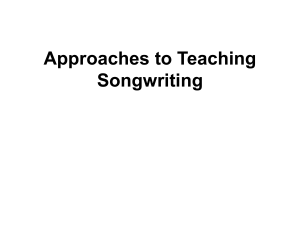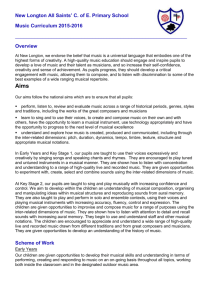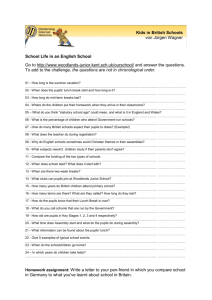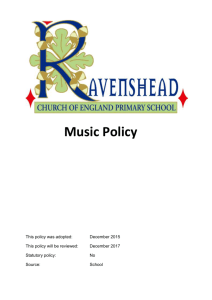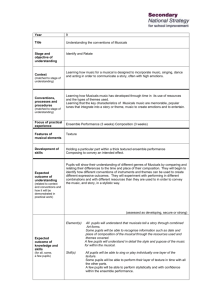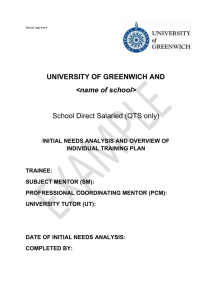Pupils` perceptions of their learning in music
advertisement
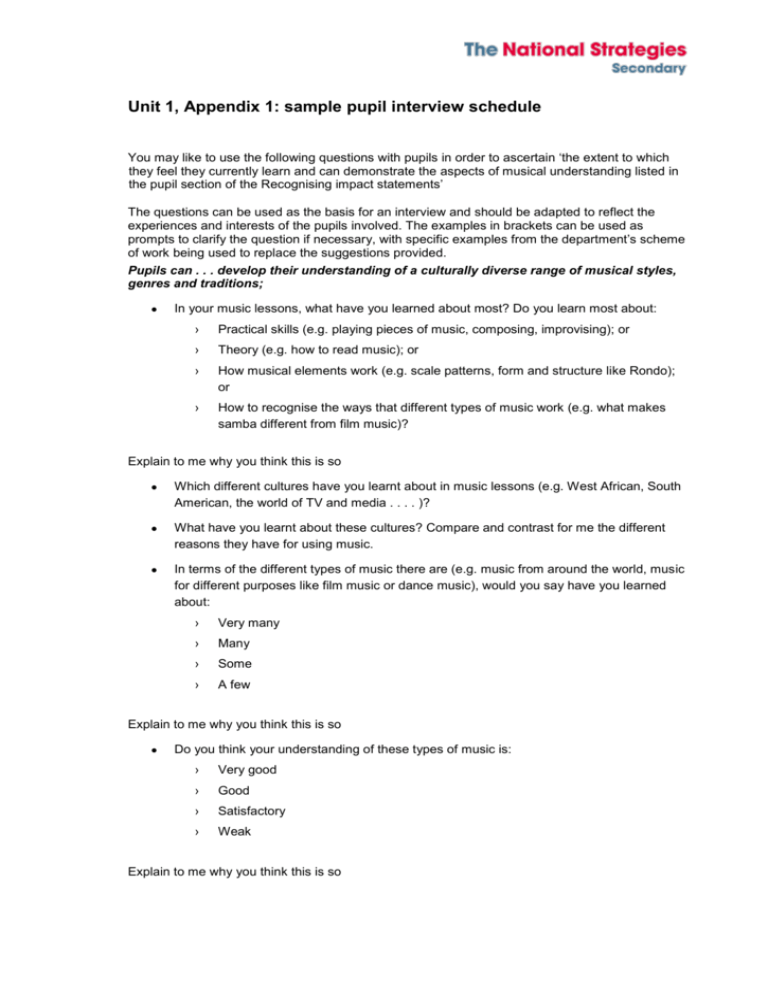
Unit 1, Appendix 1: sample pupil interview schedule You may like to use the following questions with pupils in order to ascertain ‘the extent to which they feel they currently learn and can demonstrate the aspects of musical understanding listed in the pupil section of the Recognising impact statements’ The questions can be used as the basis for an interview and should be adapted to reflect the experiences and interests of the pupils involved. The examples in brackets can be used as prompts to clarify the question if necessary, with specific examples from the department’s scheme of work being used to replace the suggestions provided. Pupils can . . . develop their understanding of a culturally diverse range of musical styles, genres and traditions; In your music lessons, what have you learned about most? Do you learn most about: › Practical skills (e.g. playing pieces of music, composing, improvising); or › Theory (e.g. how to read music); or › How musical elements work (e.g. scale patterns, form and structure like Rondo); or › How to recognise the ways that different types of music work (e.g. what makes samba different from film music)? Explain to me why you think this is so Which different cultures have you learnt about in music lessons (e.g. West African, South American, the world of TV and media . . . . )? What have you learnt about these cultures? Compare and contrast for me the different reasons they have for using music. In terms of the different types of music there are (e.g. music from around the world, music for different purposes like film music or dance music), would you say have you learned about: › Very many › Many › Some › A few Explain to me why you think this is so Do you think your understanding of these types of music is: › Very good › Good › Satisfactory › Weak Explain to me why you think this is so Pupils can . . . understand how music reflects and is influenced by the contexts within which it is created, performed and listened to; Music is affected by where, how and why it is created or used (e.g. samba is loud because it is outdoors processional music; or film music uses dissonant chord clusters to create a feeling of tension to emphasise the action . . . ). What have you learnt in music lessons about the way that the context or function of any music we have studied makes the music like it is? Composers are often influenced by the purpose of the music when they decide how their music should sound (e.g. the instruments they choose, the speed of the performance – so a piece of blues music might be slow and use low, heavy sounding instruments . . . . ). Describe to me some examples of how the decisions you made when you were composing were influenced by something you had learned about the context for that type of music. Do you think your understanding of the way that music is influenced by its context or purpose is › Very good › Good › Satisfactory › Weak Explain to me why you think this is so Pupils can . . . articulate verbally and practically the conventions, processes and devices of different musical styles, genres and traditions; Think of your favourite type of music, and least favourite. Now describe the main differences between them – how would I recognise them as being this type or that type of music? We can usually explain why one type of music sounds different from another (e.g. folk music is distinctive because of the way it uses particular sets of instruments, dance rhythms, structures that link a number of dances together, a unique ornamentation style, etc). What have you learnt in music lessons about what makes any one type of music distinctive – why you can recognise it as being one type of music and not another? Can you describe the technical differences between different types of music: › Very well › Well › Reasonably well › Not very well Explain to me why you think this is so Pupils can . . . understand how the features of musical elements impact on music; Different types of music use the elements of music (e.g. pitch, rhythm, dynamics) in particular ways (e.g. West African music uses rhythms to create a lively dance feel . . .). What have you learnt about how any sort of music uses one of the elements to create an effect? Can you describe the detail of this (e.g. how polyrhythms are created and used)? Is your understanding of how features of musical elements are used to create and change music: › Very good › Good › Satisfactory › Weak Explain to me why you think this is so Pupils can . . . use relevant practical skills for music making; Describe for me any musical skills you have learned that you did not have before you started at this school (e.g. singing solo or in a group; playing a keyboard; improvising melodies . . . ) Describe for me exactly what you have learned to do (e.g. how to compose a song with a clear structure using verses and choruses . . . ) Is your ability to use practical skills in music making: › Very good › Good › Satisfactory › Weak Explain to me why you think this is so Pupils can . . . be inspired by vibrant and relevant music making. Can you describe a performance of yours, or of someone else in the class, that you really enjoyed? Have you gone to listen to or buy CDs of or download any music we have studied? How well inspired are you by music making in lessons: › Very well › Well › Reasonably well › Not very well Explain to me why you think this is so
![afl_mat[1]](http://s2.studylib.net/store/data/005387843_1-8371eaaba182de7da429cb4369cd28fc-300x300.png)
